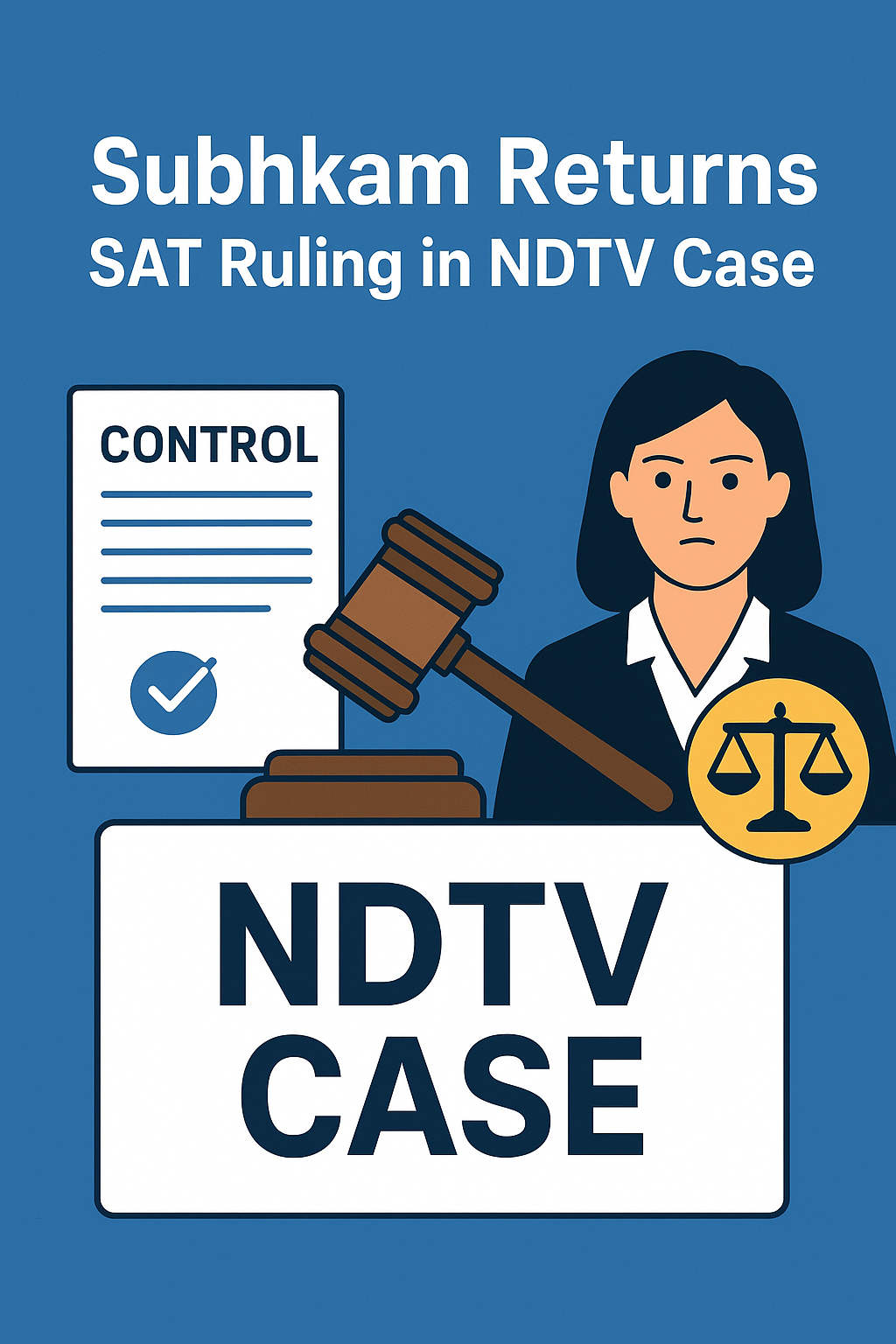View News
Subhkam Returns: SAT Ruling in NDTV Case and the Revival of Positive Control Construct

Subhkam Returns: SAT Ruling in NDTV Case and the Revival of Positive Control Construct
By Mayank Garg | Legalmantra.net | October 2025
The interpretation of the term “control” under the SEBI Takeover Regulations, 2011 has been a subject of legal debate for years. While the first limb—right to appoint a majority of directors—is relatively straightforward, the second limb—control over management and policy decisions—has often led to complex disputes, especially in situations involving minority shareholders with veto or affirmative voting rights.
The recent SAT ruling in the NDTV case has revived a significant legal precedent on the meaning of “control” established in the Subhkam Ventures Case, bringing clarity to the scope of takeover obligations under SEBI regulations.
1. Background: Subhkam Ventures Case
In Subhkam Ventures (I) Private Limited v. SEBI (SAT Appeal No. 8 of 2009), the appellant had been granted extensive veto rights, including:
-
Amendment of charter documents
-
Alteration of share capital
-
Approval of annual business plans and deviations
-
Sale or disposal of assets outside the ordinary course of business beyond certain thresholds
-
Incurrence of indebtedness and capital expenditure limits
-
Appointment of key officials and determination of their powers and remuneration
-
Incorporation of subsidiaries or acquisition of shares, debentures, bonds, or other securities
SAT, while allowing the appeal, held that “control” under the Takeover Regulations is limited to proactive or positive control, and does not extend to reactive powers or negative control. The Tribunal emphasized that affirmative voting rights granted to investors were primarily for protecting the investment and ensuring good corporate governance, rather than exercising day-to-day operational control.
This ruling was considered landmark because it clarified that mere veto or blocking rights do not amount to control. However, when the matter was appealed to the Supreme Court, the Court neither affirmed nor rejected SAT’s interpretation and specifically stated that the SAT order cannot be treated as a precedent, leaving the legal position somewhat uncertain.
2. Signs of Revival: ArcelorMittal Case
The ArcelorMittal India Private Limited v. Satish Kumar Gupta & Ors. (AIR 2018 SC 5646) judgment indirectly revived the Subhkam principle. While interpreting “control” under Section 29A(c) of the Insolvency and Bankruptcy Code, 2016, the Supreme Court held that:
-
Positive control is necessary to constitute control.
-
Mere power to block special resolutions or veto rights cannot amount to control.
-
The SAT reasoning in Subhkam Ventures was cited favorably as supporting the interpretation of effective control.
Although ArcelorMittal did not deal directly with SEBI Takeover Regulations, it reinforced the positive control construct as a relevant principle in corporate governance and investment protection.
3. SAT Ruling in NDTV Case
The NDTV case involved VCPL, which held certain financial instruments (loan with warrants as security and call option agreements). SEBI initially concluded that VCPL had acquired control over NDTV and directed an open offer to public shareholders.
On appeal, SAT carefully analyzed the agreements and held that:
-
VCPL did not acquire control over NDTV, as the agreements only conferred affirmative or veto rights, not the right to direct management or policy decisions.
-
These rights were meant to ensure good corporate governance, not operational control.
-
The ruling reaffirmed that negative control (veto/consent rights) does not constitute “control” under SEBI regulations.
Key Rights Held Not to Amount to Control:
-
Approval of amendments to charter documents
-
Issuance or buyback of securities
-
Reduction or alteration of share capital
-
Encumbrance on shares
-
Raising loans
-
Establishing subsidiaries
SAT further noted that the Subhkam precedent is now revived since the Supreme Court in ArcelorMittal had approved the positive control interpretation.
4. Implications for Investors and SEBI Takeover Regime
The NDTV ruling provides significant clarity for financial investors holding affirmative or veto rights in listed companies:
-
Affirmative rights for governance purposes do not trigger open offer obligations.
-
Proactive/positive control remains the threshold for takeover obligations.
-
SEBI may still challenge SAT rulings in certain cases, but the judgment strengthens the position of minority investors seeking protective rights without acquiring control.
This ruling may be particularly relevant in structured investments, private equity, and corporate debt-to-equity arrangements where investors often negotiate veto rights without intending operational control.
5. Conclusion
The SAT ruling in the NDTV case marks a significant step in clarifying the concept of control under the Takeover Regulations, 2011. By reaffirming the Subhkam positive control principle, it ensures that negative control or veto rights alone do not amount to control, providing predictability for investors and improving corporate governance frameworks.
However, as SEBI has historically taken critical cases to the Supreme Court, further litigation cannot be entirely ruled out. For now, the NDTV judgment serves as a welcome reaffirmation of legal principles around affirmative rights, corporate governance, and takeover obligations in India.
References:
-
Vishvapradhan Commercial Pvt. Ltd. v. SEBI, Appeal No. 293 of 2018
-
Subhkam Ventures (I) Private Limited v. SEBI, Appeal No. 8 of 2009
-
Securities and Exchange Board of India v. Subhkam Ventures (I) Pvt. Ltd., Civil Appeal No. 3371 of 2010
-
ArcelorMittal India Pvt. Ltd. v. Satish Kumar Gupta & Ors., AIR 2018 SC 5646
-
NDTV Case Analysis, Caravan Magazine: NDTV–VCPL–SEBI
Unlock the Potential of Legal Expertise with LegalMantra.net - Your Trusted Legal Consultancy Partner”
Disclaimer: Every effort has been made to avoid errors or omissions in this material in spite of this, errors may creep in. Any mistake, error or discrepancy noted may be brought to our notice which shall be taken care of in the next edition In no event the author shall be liable for any direct indirect, special or incidental damage resulting from or arising out of or in connection with the use of this information Many sources have been considered including Newspapers, Journals, Bare Acts, Case Materials , Charted Secretary, Research Papers etc

